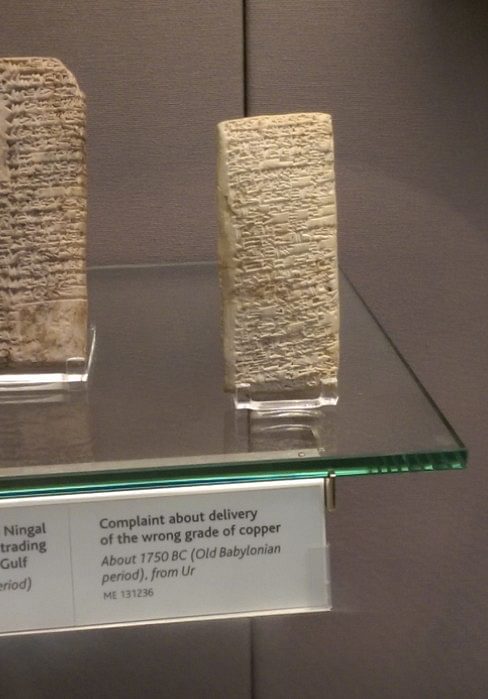
3769 years ago in 1750 BC in the city of Ur, which is part of ancient Babylon (now southern Iraq), Nanni has heard a merchant by the name of Ea-Nasir has travelled to the Persian Gulf to buy copper and is now selling it. Nanni agrees a deal with Ea-Nasir to buy some of the copper ingots.
Nanni dispatches his servant with his money to buy the copper. Crossing a war zone, the servant buys the copper ingots and returns to Nanni.
The copper which the servant returns with is not to the standard Nanni expected, and his servant says he was treated rudely when dealing with Ea-Nasir.
Annoyed, Nanni writes a letter of complaint written in a form of writing called cuneiform on a clay tablet 3cm thick, 12cm long and 5 cm wide.
In the letter, Nanni writes:
‘You did not do what you promised me. You put ingots which were not good before my messenger and said: "If you want to take them, take them; if you do not want to take them, go away!"
‘What do you take me for, that you treat somebody like me with such contempt? I have sent as messengers gentlemen like ourselves to collect the bag with my money (deposited with you) but you have treated me with contempt by sending them back to me empty-handed several times, and that through enemy territory. Is there anyone among the merchants who trade with Telmun who has treated me in this way?
‘You alone treat my messenger with contempt! On account of that one (trifling) mina of silver which I owe(?) you, you feel free to speak in such a way, while I have given to the palace on your behalf 1,080 pounds of copper.’
‘How have you treated me for that copper?’
‘You have withheld my money bag from me in enemy territory; it is now up to you to restore (my money) to me in full.’
‘Take cognizance that (from now on) I will not accept here any copper from you that is not of fine quality. I shall (from now on) select and take the ingots individually in my own yard, and I shall exercise against you my right of rejection because you have treated me with contempt.’
How do we know all of this happened?
Because as shown in the photograph, this oldest known recorded complaint is kept in the British Museum.
Now discovering this document existed amazed me - a cursory check of the internet will tell you that it is generally held that the Old Testament part of the bible was written between 1200 and 165 BC.
So even if we take 1200 BC, it means that 550 years before the Bible was written, we were making written complaints about customer service!
(I am not making any kind of point here about religion and I know many of the Bible’s stories were passed orally long before that).
I found this simultaneously both oddly reassuring and also intriguing that, I think it safe to say, we still haven’t reached a point as humans where trading and providing services has progressed to such a point that letters with this content are not needed to be written today.
It seems from the letter that much like today, Nanni as a customer wants to know he is valued and it is the perceived lack of respect that features more in the letter than the quality of the goods received.
In the letter you can sense Nanni’s emotions are high and it is the impact the interaction has had on Nanni’s perception of how he should be viewed and treated is paramount.
How many of complaints received today 3769 years later are similar?
Naturally reading this complaint has led to many other questions:
- Was Ea-Nasir operating in a regulated environment?
- Did Nanni escalate his complaint to an ombudsmen?
:)
Of course the big questions are:
- What was Ea-Nasir’s response ?
- Did Ea-Nasir offer Nanni some complimentary copper?
- How was the complaint resolved?
And finally I have a question for complaints experts out there in my connections – I would love to know what you make of the letter and how you might have responded to Nanni?